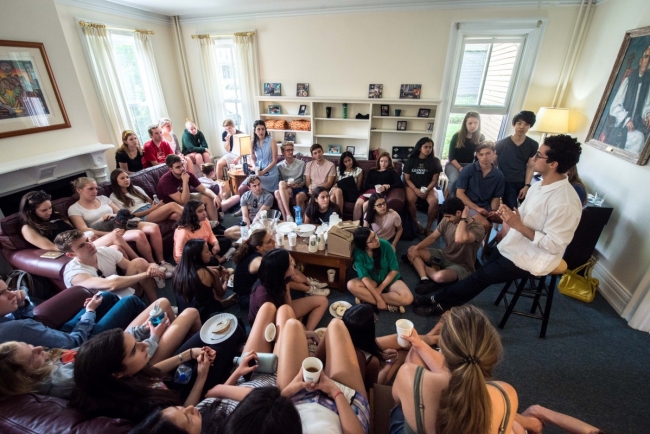You have /5 articles left.
Sign up for a free account or log in.

Workshop No 1. at Princeton
Vincent Po
Ask any college student how their day is going and they’ll likely say, “It's busy.”
“My students have résumés and CVs that are longer than most adults' when they’re 18,” said Justin McDaniel, a religion professor at the University of Pennsylvania. “They have internships up the ass, they shadowed this person, they won on the debate team."
Taking time for silence, self-reflection and introspection doesn't top students’ to-do lists, and neither does seeking out mental health services, McDaniel said. "They look at it as taking up time.”
Several programs -- including McDaniel’s course at Penn, a student group at Princeton University and a contemplative studies course at Vassar College -- share a common goal: encourage students to slow down, relax and learn how to manage the problems they’ll face outside of college.
McDaniel teaches a course that meets once a week for seven hours, with no homework, no tests and no syllabus. Instead, every Tuesday he hands students a book upon arrival, which they read from cover to cover. After four or five hours of silent reading time, the group discusses the book.
The 300-level course, called “Existential Despair,” isn’t about anything, McDaniel said; it’s a place where students can “learn for the sake of learning, reflect for the sake of reflection and talk about issues that will actually come up as adults.”
Such issues include addiction, a cancer diagnosis, the death of a loved one or losing a job. In past semesters, McDaniel assigned Junkie by William Burroughs, The Bluest Eye by Toni Morrison, The Sailor Who Fell From Grace With the Sea by Yukio Mishima and The Wonder by Emma Donoghue.
"They can all reflect upon [the book] because they’re all experts on that book,” he said.
Leveling the playing field was a priority for McDaniel, who noticed that students without a humanities background often shy away from taking literature courses for fun.
“They go into these classes and they feel intimidated because they don’t know Foucault’s latest theory on Shakespeare … then they get resentful of the people who actually didn’t do the reading but [participate] in discussion,” he said.
He’s noticed a huge difference in the quality of class discussions, in and outside class.
“In 17 years of teaching, there is no comparison,” he said. “It’s the best conversation I’ve ever had in a classroom.”
The students are graded on attendance and participation, and they’re required to write a two- to three-page journal entry each week, which they often complete in class. They also contribute to an online, weeklong discussion forum.
In his other classes, McDaniel said, “I pose questions online and people would write two or three lines to get their five points. Now, I’m getting five to six pages from each student, and they’re responding to each other.”
He also observed a gender flip during conversations. Women are speaking up more often than men, the reverse of the norm at Penn.
Each reading period includes a 20- to 30-minute dinner break, and McDaniel collects students’ cellphones at the beginning of class. Students spread out across three floors of a building and bring tea, coffee and food for a partner McDaniel assigns.
“We say these kids are addicted to technology -- they’re not. When I started this class I thought there was going to be tons of napping, and there’s not. It’s so rare, so rare,” he said.
Alec Gewirtz, a senior religion major at Princeton University, had a similar goal. Last February he founded Workshop No. 1, a student group that meets on Saturday mornings to work through questions and problems students confront outside of their academic lives.
“Students didn’t have a place where they could reflect on how to build more fulfilling lives,” Gewirtz said. “They often found that they couldn’t do that in the classrooms, and students who weren’t involved in religious groups didn’t have a place where they can do that.”
Gewirtz likened the workshop to religious communities that people lean on for support and guidance, but the group has no religious ties or requirements to join. At each meeting, a student presents on a topic or problem they are facing in their own life -- such as building a meaningful relationship with their parents as adults, handling the death of a loved one or navigating some part of their career. Then, others will chime in about how they’ve confronted a similar problem. Discussions last about an hour.
Over 100 students are part of Workshop No. 1, and about 60 to 70 students attend the hourlong meetings any given week. In addition, they have the option to break into small groups of four members that meet on their own time to identify goals, create a plan and hold each other accountable.
Sophie Steinman-Gordon, a junior politics major, joined the workshop earlier this fall.
“I love it. I think that especially at a place like Princeton where your day-to-day life can get so consumed with school and stress that comes from school, it’s really important to have a space to step back,” she said.
In one meeting, Steinman-Gordon recalled a member who spoke about relationships and how to be vulnerable without relying too heavily on another person.
“The member who presented … her boyfriend was in the room,” she said. “That just is indicative about how healthy of a space it is, if someone can share something about an intimate relationship while their partner is in the room.”
Jaime Cuffe, a senior computer science major, said the group has fostered a fierce sense of community.
“It can be difficult to get a group of 50 people to commit to anything at Princeton, but what Alec has been able to create here as been really, really powerful,” he said. “There’s a saying that ‘we’re the average of the five of our closest friends.’ When I look around the room in any of the workshop sessions, I think, ‘I would be lucky to be the average of any of these five people.’”
At Vassar College in New York, Carolyn Palmer, a psychology professor, debuted an Introduction to Contemplative Studies class this fall. Each week, students in the class are introduced to different methods of contemplation and introspection -- everything from social justice and pilgrimage to journaling and meditation.
“People are thirsty for the tools and the experiences that broaden our lives, and the ways in which we can keep asking important questions of ourselves and of each other,” Palmer said.
In addition to regular classroom periods, students meet for a “lab” period once a week, similar to science course schedule. One day, a music professor walked students through the “soundscape” and asked them move slowly, focusing on their balance and what they heard. During another lab, a staff member at the counseling center led the students through meditation.
Ten students make up the pilot class, which is a typical class size for Vassar, and Palmer hopes that more students will be interested in the course once word spreads.
“They’re experiencing a wide variety of practices, and they’re reflecting on this for themselves. They are also interviewing other people about those people’s experience with contemplative practice, and then they do half-a-semester-long personal project that they want to explore in more depth,” Palmer said. “They’re getting first-person, second-person and third-person experience with contemplative studies.”








